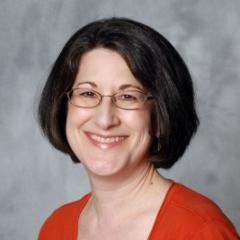
Volunteer of the Month: Sharon Kohn
Cantor Sharon Kohn is a graduate of the DFSSM-HUC-JIR. She is the Chesed/Pastoral Care Director at The Temple, B’nai Jehudah located in the greater Kansas City community.
In what capacity have you volunteered for the ACC?
I got involved with the ACC early on. In 1981, I attended the convention in Toronto. It was the summer after my first year at school. There was a discount for students to attend, which was an innovation at that time. Benny Maissner was the chair and he was very welcoming. It was a fabulous convention and I was hooked.
Once I graduated, Cantor Gedalia “Gus” Gertz (z’l) from Ohio reached out to me. He said,”I remember you from convention! You can co-chair Nominations with me.” That’s how it started. I have stayed active on and off the Board ever since. I co-chaired the Colorado convention in 1990 and the Houston convention in 1995 and was the program chair for the last Chicago convention.
In 1997, I moved to Cincinnati to accept the joint position of cantor at HUC-JIR and for Wise Temple. Bonia Shur (z’l) had created a workshop called Mifgash Musicale prior to my arrival. He ran it for only a few years. I got to revive this with him. In 2000, it focused on Bonia’s music almost exclusively. The GTM was involved with the new incarnation. The next year, the then UAHC became a co-sponsor with the College, other composers and instructors were included and it expanded beyond Shabbat repertoire. I’m really pleased that it has taken on a life of its own.
I served on the Board at two different times and have completed 15 years total. I also was a member of the Joint Commission on Worship, Music and Religious Living. I am most proud of having been the co-chair with Kay Greenwald of the Task Force on Membership, Placement and Certification. Many of the aspirations that emerged from that work come into fruition and laid the groundwork for the exciting things that are happening now.
What’s the best part about being a Cantor?
Being with people; getting to sit and be with people. There is a difference between “effect” and “affect” and we don’t always know the impact that is made.
I remember checking in with someone who was on the mi shebeirach list who said “my cousin isn’t doing so well”. We talked a bit more and that was the conversation. The next day I received a call back from him. He said that my call motivated him to reach out to his cousin who he hadn’t called in quite a while. He was genuinely moved and thanked me for reaching out. His call made my day. Most of the time we don’t know the difference we make, or at least not immediately. We do what we do and do the best we can. And yet, each of us does these kinds of things in our work every moment.
What is the most serious problem facing the cantorate presently and in the future?
I prefer to see that there are challenges, not problems. I think our challenge is to not put ourselves in a box and to really understand what it is each of us are called to do. If we can hold onto that – then whatever comes our way – whatever frustration or challenge that we encounter can be seen through the lens of our unique mission. And using that filter, we can decide if “X” is in alignment with our own core purpose. If yes, then we can work it out. If not, we should let “X” go.
What influenced and/or motivated you to become a Cantor?
My earliest influence was my parents and their love of music which they passed on to me. We attended concerts and plays and they passionately taught and love Judaism. They were very active lay leaders in congregational life of a small town congregation. Moses Montefiore Temple was founded in 1885 as a Reform congregation in Bloomington, IL.
I became involved in teaching in the Religious School. There was an older kid in the classroom with a guitar in the classrooms teaching music. That captivated me. As I found my voice, I became more and more involved with B’nai Mitzvah students and with leading music for the congregation. Rabbi Gershon Blackmore encouraged me to become a cantor. He said, “The world has enough sopranos, what it needs are cantors.”
What is one thing you’d like to tell us about yourself, that we might not know about you?
I love to keep score when I go to baseball games! I love the Kansas City Royals but watching kids play is still the best.
I learned how to crochet when I volunteered at Greene Family Camp. I had never gone to camp as a child – but I went as clergy. One day I noticed the wife of one of the other staff crocheting and asked if she would teach me. Sarah said, “Watch me, and I will teach you.” After a week I could crochet in a circle. It took me a few years to figure out how to crochet in a line!

